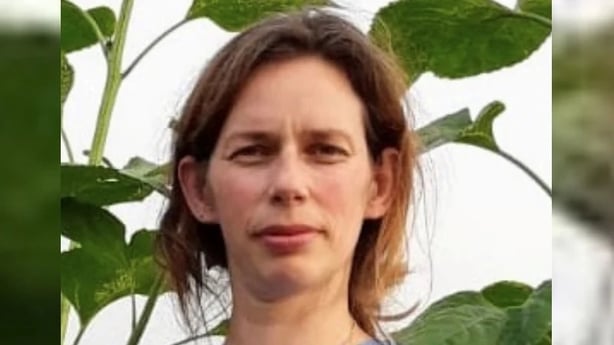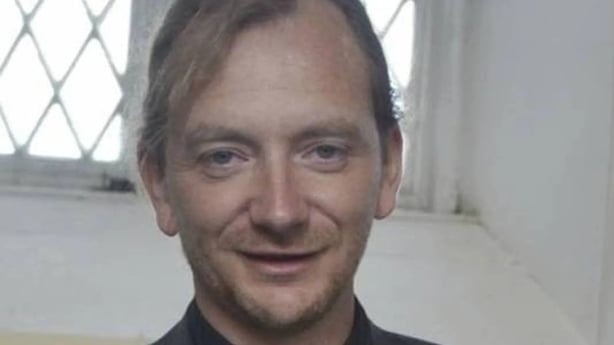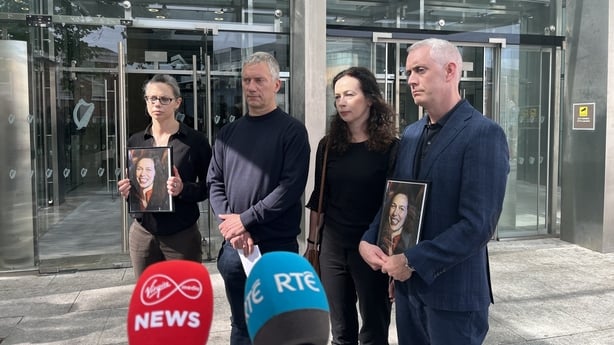A brother of a woman killed by her husband has told the Central Criminal Court that she died in terror for her own life and the lives of her children.
David French said that although he had asked the congregation at the funeral of 41-year-old Valerie French Kilroy to pray for her killer, there was no forgetting, no forgiveness and he said there never would be.
Ms French Kilroy's 51-year-old husband, James Kilroy was given the mandatory sentence of life in prison after being found guilty last week of murdering his wife in June 2019.
Kilroy had claimed he was insane and suffering from cannabis induced psychosis or a form of acute and transient psychotic disorder.
However, the jury convicted him of murder.
Mr Justice Tony Hunt said Kilroy’s actions had caused enormous and permanent damage and the fallout from the night he killed his wife would continue for years to come.
Valerie French Kilroy was an occupational therapist with Mayo Mental Health Services.
She was described as an immensely popular woman with a wide circle of friends.

She and her husband, a park ranger, had been married for 11 years and had known each other for the previous ten years.
On the night of 13 June 2019, Ms French Kilroy was out visiting friends.
At some point after she returned, her husband set upon her with a knife, beat her and strangled her.
Kilroy was found on the morning of 14 June, wandering naked in a nearby field.
His wife’s body was found that afternoon in a campervan beside their remote bungalow around 6km from Westport.
She had been beaten, stabbed and strangled.
Cannabis intoxication not a defence for murder - prosecution expert
Kilroy told gardaí and psychiatrists of various delusional beliefs, including a belief that his wife was a zombie or that she was working with Donald Trump’s bodyguards to capture, torture and kill him.
He was a regular cannabis user and had a previous psychotic episode related to drug use in 2001.
Experts called by the prosecution and defence disagreed about whether Kilroy met the criteria for a verdict of not guilty by reason of insanity.
Prosecution expert Professor Harry Kennedy said he was most likely suffering from cannabis intoxication or withdrawal and this was not a defence to murder.
The defence said he was not intoxicated at the time and was suffering from cannabis induced psychosis or a transient psychotic disorder.
In his victim impact statement, David French said he was speaking on his own behalf and on behalf of his three sisters.
He said the impact of their sister, Valerie’s death was beyond words.
Mr French said their mother died soon afterwards.
He said she had been in deep shock and could not come to terms with what he described as "this evil act".

He said she was under tremendous stress and then died suddenly. He described the impact of their sister’s death as a death sentence for their mother.
Mr French said he and his sisters had been consumed by the murder and there was no end in sight.
He said they had lost someone who was a "continual source of joy and loving consideration".
He added that their children had been deeply traumatised by the loss of their auntie and haunted by the thoughts of the killer who was someone they had welcomed into their family and as a guest in their homes.
Mr French said his sister’s murder was violent and prolonged and she had died in terror for her own life and the lives of her children.
He said although he had asked the congregation at her funeral to pray for the person responsible for her death, nobody should confuse that request with any form of forgiveness or forgetting.
"There is no forgetting, there is no forgiveness and there never will be," he said.
Mr French said his sister’s innocent children had been robbed of an extremely, capable talented and loving mother who literally gave everything she could to them when she was alive and ended up giving her life for them.
He expressed his fear that when the children were adults they would learn the full story of their mother’s death "with all the inhumane and horrifying details".
He described that as being like a minefield in their future.
Agony then and now
Mr French said his sister was strong mentally and physically.
She was someone who spent her work life helping others he said and "enabled, supported and gave space to her killer".
He said she simply wanted a marriage with a loving home in which to raise a family.
He accused Kilroy of attempting to control the narrative and avoid accountability and said he had not shown any remorse to them to date.

Mr French said it felt like Valerie was murdered again every morning when he woke and realised it had really happened.
"It was agony then and it is agony now," Mr French said.
He said he was affected by the fact that her death was intentional and carried out by someone who was known to her.
He said she had died in an "absolutely horrific way" and there was "an utterly terrifying black hole of silence" where his sister used to be.
He described having to continually work to contain a frightening level of anger and sheer rage at what the killer had done.
Mr Justice Hunt said the family of Ms French Kilroy still had so much to cope with.
He said it was obvious that she was devoted to her family, friends and community.
She was a relatively young woman, he said, and her life had been very cruelly terminated.
The judge said the case showed the consumption of cannabis was not "a completely risk-free zone".
Kilroy’s indulgence in cannabis was a very significant part of what led to the murder, he said, adding that Kilroy’s only previous psychotic episode was also drug-induced.
He said Kilroy was on full notice at all times of the potential effects of misusing cannabis, yet he went on to do so.
The judge said the 2006 act allowing for a verdict of not guilty by reason of insanity was "designed for ill people, not for people who get themselves into a state on a self-induced basis".
He said the evidence in the case fell short of attracting any defence under the act.
Drug-induced psychosis has been used as a defence in previous cases before the Central Criminal Court.
In March this year, Diego Costa Silva was found not guilty by reason of insanity of the murder of his wife Fabiole Campara de Campos Silva in November 2021.
The court heard that he was suffering from cannabis-induced psychosis at the time.
This is likely an issue which may end up before the Supreme Court.
Mr Justice Hunt said it was hard to survey the wreckage left by Kilroy without getting depressed and he wished the French family well in trying to pick up the pieces, in so far as that could be done.
Outside court, Mr French thanked the gardaí and lawyers involved in the case.
He said it was a result of men’s violence against women and urged any woman who was being abused or controlled to contact gardaí "while they still can".
Mr French described his sister as a wonderful person who was the main breadwinner for her family.
He also said a "loophole" in legislation which allows murderers to retain their parental rights should be closed as it has already been in the UK.






